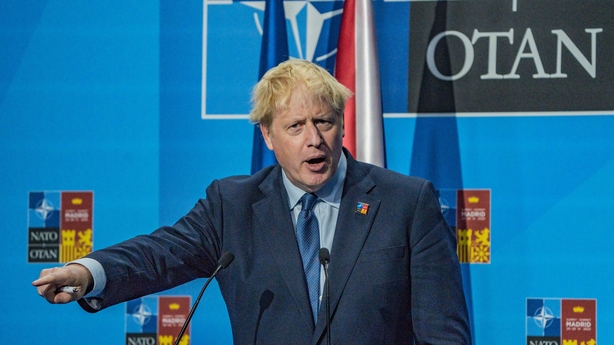A bullish President Joe Biden today announced $800 million in new weapons for Ukraine and said the United States will support Kyiv "as long as it takes" in its war against Russia.
As Western-armed Ukrainian forces notched up a victory by recapturing strategic Snake Island in the Black Sea, and NATO leaders expressed strong unity during their Madrid summit, Mr Biden made clear he intends to keep the pressure on President Vladimir Putin.
"Before the war started, I told Putin that if he invaded Ukraine, NATO would not only get stronger but would get more united," an energised looking Joe Biden told a press conference in Madrid.
He spoke before returning to Washington after the NATO summit and a meeting of G7 leaders earlier in Germany, where he did not hold a press conference and kept a relatively low profile.
The Democrat announced yet another $800 million disbursement of US funding for Ukraine's military in "the next few days".
This will include "advanced Western air defence systems for Ukraine, more artillery and ammunition, counter-battery radar, additional ammunition for the HIMARS multiple launch rocket systems that we've already given Ukraine and more HIMARS coming from other countries as well."
The plans for fresh aid, as NATO repositions itself again on a Cold War footing with a massive forces build-up, came as Ukrainians used Howitzers to retake Snake Island.
Mr Biden had earlier pledged more American troops, warplanes and warships for Europe as NATO agreed to strengthen its deterrents, putting more than 300,000 troops on high alert from the middle of next year.
"The US is doing exactly what I said we would do if Russia invaded, enhance our force posture in Europe," Mr Biden said.
"The United States is rallying the world to stand with Ukraine."
We need your consent to load this rte-player contentWe use rte-player to manage extra content that can set cookies on your device and collect data about your activity. Please review their details and accept them to load the content.Manage Preferences
British Prime Minister Boris Johnson said London would provide another £1 billion (€1.16bn) in military aid to Ukraine, while his French counterpart Emmanuel Macron said France would soon deliver six more CAESAR guns.
Mr Putin did not appear ready to withdraw or negotiate the terms of a peace deal, Mr Johnson said.
"There doesn't seem to be anything to talk about. Because it's not only that the Ukrainian people would find it very difficult to do a deal, Putin isn't even offering a deal," he told a news conference.

In the biggest shift in European security in decades, Finland and Sweden will sign the formal accession protocol next Tuesday to join NATO, NATO Secretary-General Jens Stoltenberg said, although ratification could take a year.
Turkish President Tayyip Erdogan, however, told a news conference at the close of the summit that the Nordic nations must first keep the promises in a deal for Turkey to lift its veto on their NATO membership bids.
Mr Erdogan said Sweden had promised to extradite 73 individuals that he described as terrorists.
"First Sweden and Finland should carry out their duties and those are in the text ... But if they don't, of course it is out of the question for the ratification to be sent to our parliament," he said.
Russia's Vladimir Putin said today that Russia would respond in kind if NATO deployed troops or infrastructure in Finland or Sweden.
Estonian Prime Minister Kaja Kallas said the West needed to be ready, particularly in terms of possible attacks on Finnish, Sweden and NATO computer networks.
"Of course, we have to expect some kind of surprises from Putin, but I doubt that he is attacking Sweden or Finland directly," she said.
Fighting on all flanks
While the three-day summit was dominated by NATO's response to Russia's war in Ukraine, host Spain urged allies to consider a bigger role for the alliance in North Africa and the Sahel.
NATO was created in 1949 to defend against the Soviet Union.
Western powers are concerned about a spike in violence in Mali, where the country's ruling military junta, backed by Russian private military contractor Wagner Group, is battling an Islamist insurgency that spills into neighbouring countries in the African region known as the Sahel.
France, whose military policy has long been focused on NATO's south, said in February that it would pull out 2,400 troops, after relations with the junta turned sour.
At Spain's urging, with support from Italy, NATO's new, 10-year master document, the "strategic concept" cites terrorism and migration as elements to monitor, and points to the southern flank as a new source of risk to stability.
Britain's Mr Johnson said he would support a bigger NATO role in the Sahel, although he did not go into details.
Spanish Foreign Minister Jose Manuel Albares said the region "is the epicentre of global terrorism".
"If the threat were very present and very concrete, we could see a reinforcement of military deployment on the southern border as we are seeing in the east," he said.

